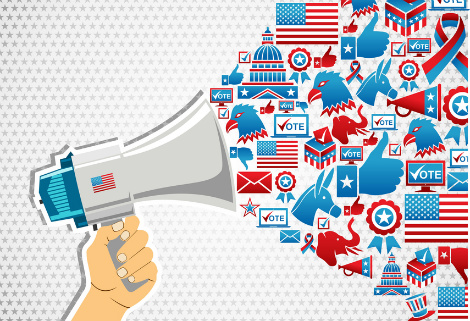Whether you’re in a national election or in a municipal runoff, social media for political campaigns can effectively mobilize your audience. However, it takes the right strategy to make the most of your outreach and to avoid common mistakes.
Senator John McCain’s campaign pioneered the use of the Internet as a fundraising platform during his 2000 presidential bid, generating $2.2 million in online donations after winning the New Hampshire primary. Senator Barack Obama updated the method in 2008, generating $55 million in donations without in-person events but through strictly social media solicitations.
While these were large national elections, campaigns of almost any size can follow a similar approach to draw attention to their candidate or issue. Here are some tips for using social media for political campaigns.
Do:
- Mix it up with multimedia: Research continues to show that multimedia boosts social engagement. A March 2014 study found that Facebook posts with photos have a higher interaction rate (87%) than links, videos, and text-only status updates combined. Another study conducted by Twitter found that adding a photos or video to your tweet boosts retweets by 35% and 28% respectively. In addition to Facebook and Twitter, consider Instagram, YouTube and Vine as social media alternatives for political campaigns.
- Be human: No one wants to follow the tweets of someone who solely brags about themselves. Use the platform to show your personality, favorite teams, photos with the family, etc. Share photos of people, real-time stories, and videos from the campaign trail and at political events.
- Combine it with other marketing: Make sure links or references to your social networks are included in your TV ads, direct mail pieces, billboards, and radio commercials.
- Provide consistent updates: Set aside a time to plan and schedule posts. If budget allows, consider adding a social media specialist to the team.
Don’t:
- Post provocative photos and videos: If you’d be too embarrassed for your grandmother to see what you’ve posted on social media, it’s likely inappropriate for political campaigns. For every virtually unknown candidate who was able to mobilize a base successfully using Facebook and Twitter and get elected, there are more candidates whose political dreams were ruined by unflattering social media exposure.
- Expect to reach everyone: While social media usage is growing in older demographics—they’re the fastest growing groups, according to a 2013 Pew Research Center report—it may not be the optimal way to reach them. Findings from that same Pew Research study found they are the only age group with less than a 50% social media adoption rate The takeaway here is not to rely solely on social media, but to have multiple outreach methods. Direct mail and TV are still really popular amongst this demographic.
- Expect a magic bullet: Social media can be remarkable form of outreach, but it should be one of many ways you get the word out about your campaign. The more diverse your media mix is, the more you increase the opportunities that you’ll be found.
- Forget to fact check before you publish: An inaccuracy or misstatement made publicly on social media can be easily found, can spread, and can hurt your credibility.
Capitol Media Solutions works with campaign managers and marketing teams to guide them in effective political media buying and social media management. Contact us to learn how we can support your team.

